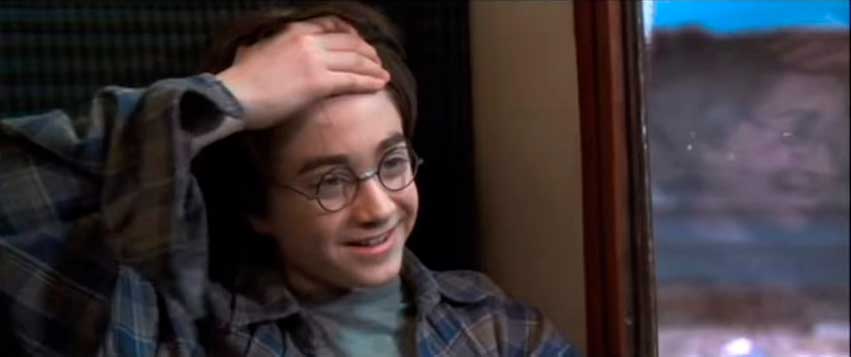



 (99 votes, average: 5.00 out of 5)
(99 votes, average: 5.00 out of 5)The readers can download Harry Potter and the Sorcerer's Stone Audiobook for free via Audible Free Trial.
Listen online on iTunes an exciting story of a gifted 11-year-old boy Harry Porter, who lives with his relatives like a slave in their house. On his birthday he finds out that he is actually a wizard and sooner starts studying in the Hogwarts School for Witchcraft and Wizardry. In the near future a young wizard learns that this world is not so safe as he thought and there are secrets that need to be uncovered.

Exposition
Hagrid leaves an infant Harry Potter with his aunt and uncle, the Dursleys. The boy has been living there for 11 years till he learns he is a wizard.
Rising action
Upon acceptance to Hogwarts, Harry discovers that he’s one of the most famous people in the wizarding world. He becomes friends with Hermione and Ron and makes an enemy of Draco.
Climax
Friends start to understand that something terrible is happening there at Hogwarts. At the end of the school year, Harry comes face to face with Lord Voldemort.
Falling action
With the help of his friends, Harry manages to defeat Voldemort and the professor who’d been helping him.
Resolution
Harry is safe. Every student returns home.
The main protagonist characters: Harry Potter, Hermione Granger, Ronald Weasley, Rubeus Hagrid, Albus Dambledor, Minerva MCGonagall.
The main antagonist characters: Voldemort, Professor Quirrell, Draco Malfoy, Severus Snape, Mr. and Mrs. Dursley, Dudley Dursley.
The book was started approximately in June 1990. Rowling spent six years working on “Harry Potter and the Sorcerer’s Stone (Philosopher’s Stone)”. By the quote of her words,
“One weekend after flat hunting, I took the train back to London on my own and the idea for Harry Potter fell into my head… A scrawny, little, black-haired, bespectacled boy became more and more of a wizard to me… I began to write Sorcerer’s stone that very evening.” Urbanette
In June 1997, Bloomsbury published Sorcerer’s Stone (Philosopher’s Stone) with an initial print-run of 500 copies in hard cover, three hundred of which were distributed to libraries.
Rowling was forced to subscribe «J. K. Rowling» instead of Joanne Rowling, because the publishing house felt that the target audience of the book was the same boys who might not want to read a book written by a woman.
Rowling has managed to infuse this book with a lovely wit and charm that will both amuse and delight adults and children. J.K. Rowling should be commended for getting so many people reading and excited by books. This book is highly recommended to anybody between the ages of 8 and 80.

At first the most prestigious reviewers ignored the book, leaving it to book trade and library publications, which examined it only by the entertainment-oriented criteria of children’s fiction. However, more penetrating specialist reviews attracted the attention of reviewers in major newspapers.
Scholastic Corporationbought the U.S. rights at the Bologna Book Fair. They thought that a child would not want to read a book with the word “philosopher” in the title.
American audiobook versions were narrated by Jim Dale and can be easily listened online on YouTube or bought as a CD on Ebay. Full report, influential quotes and the length are presented in summary.
The novels of the Harry Potter series have been translated into 74 languages of the world. As a result, Rowling became one of the most translated authors in history. The first novel “Harry Potter and the Sorcerer’s Stone” was also translated into Latin and Ancient Greek, which made it the largest published literary work in ancient Greek since the works of Heliodorus from Emesa (A.D. 3).
For the publication in the United States, it was necessary to adapt the texts to the American version of English, because many of the words and concepts used in the novel might seem unfamiliar to a young American audience.
Most of the reviews were very favorable, commenting on Rowling’s imagination, humor, simplicity, direct style and intelligent plotting, despite the fact that somebody complained about the rapid rising of events in the final chapters.
The main themes:
Family. Harry misses the family he never knew – his parents – and hates the one he’s stuck with – the Dursleys. But there are people at Hogwarts, both students and faculty, who care for him and who slowly become his new, chosen family.
Making friends. Yet for Harry Potter and some other characters who’ve been set apart by their magical abilities, making real friends is only possible at wizarding school.
Home. In Harry Potter and the Sorcerer’s Stone, school’s not just where you study and learn cool spells; it’s a real home. At Hogwarts, and in Gryffindor, in particular, Harry finally feels a sense of belonging and comfort.
Loyalty provides much of the motivation for plot points throughout Harry Potter and the Sorcerer’s Stone: characters stand up for the ideas they believe in and each other.
Courage. Harry, Ron, Hermione, and even Neville all reveal themselves as possessing outstanding bravery, and it’s their courage that helps them get through the climactic ordeals at the book’s end.
Good and bad. Voldemort – is the most awful and half-alive wizard, who was almost defeated, but not enough to gain the victory. It’s considered the hugest evil in this book. Luckily, there are examples of goodness flooding Harry Potter and the Sorcerer’s Stone. They include Harry’s parents, whose love extends beyond the grave.
The Supernatural. There’s a castle full of ghosts as well as poltergeists and other strange creatures etc. Getting mail delivered by owl, learning to Transfigure matches into needles, or finding an invisibility cloak at the bottom of your bed – it’s all part of a usual day at unusual Hogwarts School.
Contrasting Regions. Non-magical England is shown as not that exciting or interesting; it’s full of dull, narrow-minded lives. Magic England is the total opposite: everything about it is tinged with a sense of miracle. It’s a place where kids could be heroes.
The first book was followed by 6 more: “Harry Potter and the Chamber of Secrets”, “Harry Potter and the Prisoner of Azkaban”, “Harry Potter and the Goblet of Fire”, “Harry Potter and the Order of the Phoenix”, “Harry Potter and the Half-Blood Prince” and “Harry Potter and the Deathly Hallows”. All the novels of the series “Harry Potter” were also released in the audiobook versions.
From the multi-colored sorting hat, to the sinister Snape to the red glow of Ron’s hair, readers revel in glorious pictures of the illustrated epub (in pdf) and paper edition of “Harry Potter and the Sorcerer’s Stone”. It is stunning, with full color illustrations throughout from Greenaway Medal winner Kay, who breathes incredible life into these much loved characters and locations, staying faithful to Rowling’s vision but revitalizing the story for a new generation.
Release date: November the 4th, 2001 (in English)
Genre: Adventure, Family, Fantasy
Director: Chris Columbus[/exlink],
Writer: Steve Kloves, J.K. Rowling (novel)
Stars: Daniel Radcliffe, Emma Watson, Rupert Grint
It was really important to Rowling how people treat her books. The author considered it her duty to follow the fate of her creation, so she watched with special interest the transformation into the film. In Chris Columbus, she found the ideal director to start the books’ film life off the right way.
He super-successfully transferred the story to the screen, where Potter lovers and newcomers could see what all the triumph was about. It is a modern fantasy classic which value was raked in almost $1 billion worldwide and launched one of the most successful franchises – both creatively and commercially – in movie history.
“Harry Potter and the Philosopher’s Stone” is an action-adventure video game. It is based on J.K Rowling’s novel of the same name and the film adaptation.
The story follows protagonist Harry Potter, who discovers that he is a wizard, and is sent to Hogwarts School of Witchcraft and Wizardry where he makes friends and receives magical training, and along with his friends stop Lord Voldemort from returning to power.
The game received mixed reviews. Critics commented on the game’s accessible gameplay and its unimpressive graphics (2003 versions) while others said the game’s license would be the only thing to draw in fans.
Although JK Rowling didn’t intend to bestow a gift when she wrote the Harry Potter series, she has provided her readers with the magical learning she has infused in the book. Having listened to the audiobook “Harry Potter and the Sorcerer’s Stone” it is possible to learn such lessons:
“Harry Potter and the Philosopher’s Stone” was a runaway success despite inadequate and poorly organized marketing. Stephen Brown recommended that marketing executives should treat the stories as “a marketing masterclass”, full of enticing products and brand names.
In August 1999, the book topped the New York Times list of best-selling fiction, and stayed near the top of the list for much of 1999 and 2000, until the New York Times split its list into children’s and adult sections under pressure from other publishers who were eager to see their books given higher ranking.
The audio version (mp3) for “Harry Potter and the Philosopher’s Stone” book read by Stephen Fry was published in 2002. And Harry Potter and the Sorcerer’s Stone by Jim Dale was published in 2015 (Audible.com Release Date).
More than 400 millions books were sold all over the world.
Originally, the book was called “Harry Potter and the Philosopher’s Stone”. American publishers told the novice writer that the title should entice with magic and sorcery, and the word “philosopher’s ” – is not associated with magic. The author tried in vain to explain that the “philosopher’s stone” is a stable word combination, which came from medieval alchemy, meaning substance that turns ordinary metals into gold and creates an elixir of immortality. Rowling proposed the word “sorcerer’s” instead of “philosopher’s,” but later stated that she regretted about it, but she couldn’t defend the original title then. She was dictated the conditions.
704 comments
Or use one of these social networks